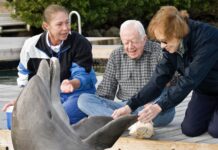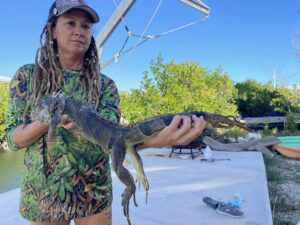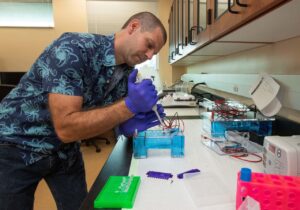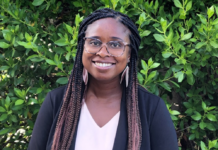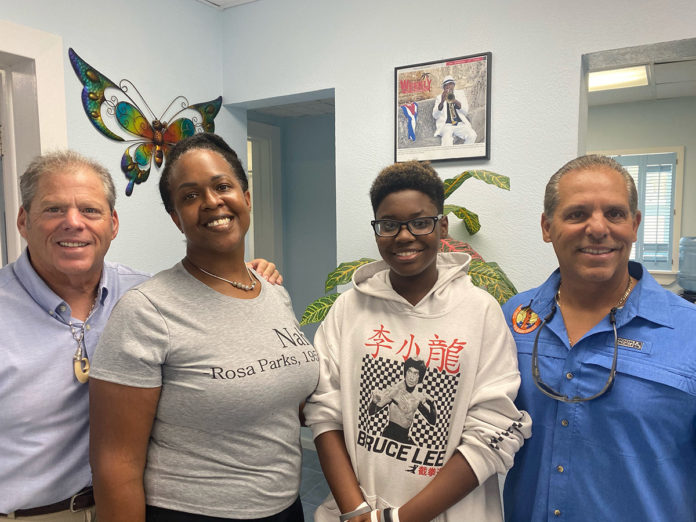
A small scholarship ceremony took place on June 2 at the beginning of Pride month. This was not an unusual occurrence, considering that Florida Keys’ high schools held similar celebrations a few days prior.
But this gathering at Keys Weekly’s Tavernier office was intimate, with little fanfare and just four attendees: scholarship recipient and Coral Shores High School graduate Brent Johnson; his mother Priscilla Johnson; Monroe County Commissioner Mike Forster; and Alexis Alba, chief operating officer of Tiki Water Sports.
As Alba and Forster gave Brent checks worth a combined total of $2,500, Forster looked at the young man.
“Everybody speaks very highly of you,” Forster said. “Your former culinary teacher, Corie Abel … college counselor Chris Harris … Ms. Z (Zofchak) the drama teacher,” Forster ticked through a long list of names.
“We are embracing the community and letting others know they are not alone,” Forster continued. “I saw a bigger story. I felt I needed to offer that to you because it is of value to you, the Keys and the community. It’s Pride Month. You’re going to have your haters. I have haters, and that’s OK. I don’t engage with them. I’m excited for you and your future.”
Eighteen-year-old Brent Johnson does have haters. Yes, he’s a scholarship recipient. Yes, he’s a future aeronautical space engineering major at the University of Central Florida. Yes, he’s a theater group member and a euphonium player in the high school band.
But Brent was also born as a girl named Brianna, and is currently transitioning to become a man.
Brent, who was adopted into Priscilla Johnson’s family, said, “I’m extremely lucky I grew up around here, where it is extremely accepting.”
“I first questioned my gender identity at the end of seventh grade,” he explained, describing his years of self-discovery as “Harsh. It took years, with lots of crying, to get the confidence to be sure.”
With his mother, he researched the difference between homosexuality and gender dysphoria. His mom Priscilla said she always supported his search for his authentic identity.
“Your own gender identity has nothing to do with sexuality,” Brent said. “I don’t have a preference for gender in terms of sexuality. I feel discomfort seeing myself as a girl with a girl’s voice and breasts. One day, when someone called me ‘Sir,’ it felt good.”
Gender dysphoria is defined by the American Psychiatric Association as “clinically significant distress or impairment related to a strong desire to be of another gender, which may include desire to change primary and/or secondary sex characteristics.”
Very few people are diagnosed with gender dysphoria. According to the APA’s Diagnostic and Statistical Manual of Mental Disorders, about 0.005% to 0.014% of males at birth and 0.002% to 0.003% of females at birth have gender dysphoria.
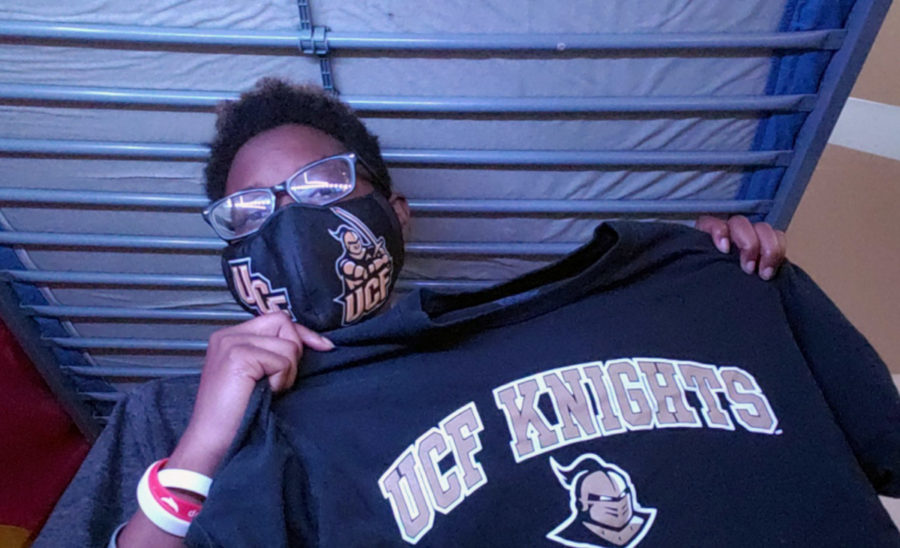
After much deliberation, he changed his name from Brianna to Brent in the ninth grade. He wants to start the physical journey to manhood with “top surgery” for gender confirmation, in which the breasts are removed. He is still deciding on whether he should do the “bottom surgery.” But Priscilla said she is firm that he must consult with doctors to make sure he is “mentally checked” before he gets such serious surgeries. Brent has also been in counseling for anxiety and depression, though mostly unrelated to his gender discovery process.
Brent said he knows about five other kids in the Upper Keys who are wrestling with their gender identity, and they have come to him for advice on how to physically resemble a boy, such as lowering their voices or flattening their breasts.
“I’m an open book,” Brent said. “I absolutely don’t mind answering any type of questions.”
Since Brent suffers from anxiety, when it came time to fill out scholarship applications for college, he felt mentally blocked.
“One scholarship required an essay about how his involvement affected someone else positively,” Priscilla said, looking at her son. “My child finds that difficult.” Brent missed the deadline on all the scholarship applications.
Brent’s father, Chris Frails, reached out to Forster for help, explaining his son’s situation. Forster had gotten to know the family during the pandemic, when he rallied together the community to distribute food to those in need. Frails and his family were some of Forster’s volunteers.
Forster immediately offered up $2,000 from his own pocket, to be repeated every year if Brent keeps up a B average at UCF. And Alba, Frails’ employer at Tiki Water Sports, gave Brent $500.
“I was over the moon,” said Priscilla, a wide smile on her face. She recalled with emotion the times when money was tight while she was going to nursing school. She couldn’t afford to give Brent singing lessons.
“But my kid’s going to Orlando and is going to stay in dorms,” she said, shaking her head in disbelief and wiping tears from her face.
Meanwhile, Brent’s goal is to fly planes, whether for the Navy or a commercial airline. He does not see his transgender identity as an impediment, though the road in front of him may not be a smooth one, and future surroundings may not always be as accepting as that of the Florida Keys.
“I have not experienced any bullying,” Brent said. “It happened once, and he apologized to me later. But I’ve seen it done to other people.”
A recent Human Rights Campaign press release said, “2021 has already seen at least 27 transgender or gender non-conforming people fatally shot or killed by other violent means.”
The HRC describes itself as “America’s largest civil rights organization working to achieve equality for lesbian, gay, bisexual, transgender and queer (LGBTQ) people.”
“If you’re not sure of your identity, it’s not set in stone,” said Brent. “Even in your 30s, 40s or 50s, you don’t have to know. There are places on the internet you can connect with worldwide. You are not alone. Go at your own pace. Be yourself. There are people in the world who are going to hate yourself for being yourself. But your attention should go toward the people who love you.”

